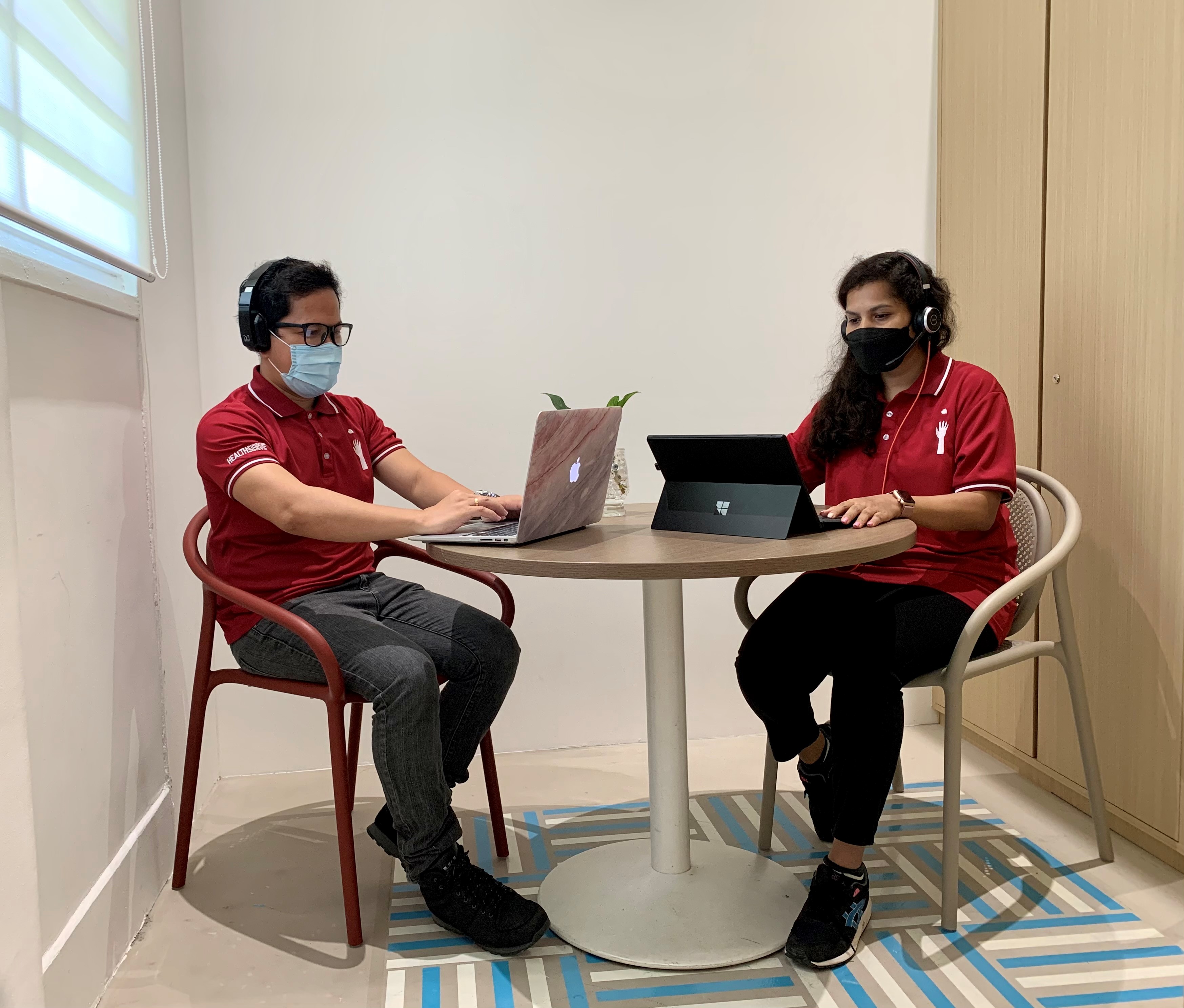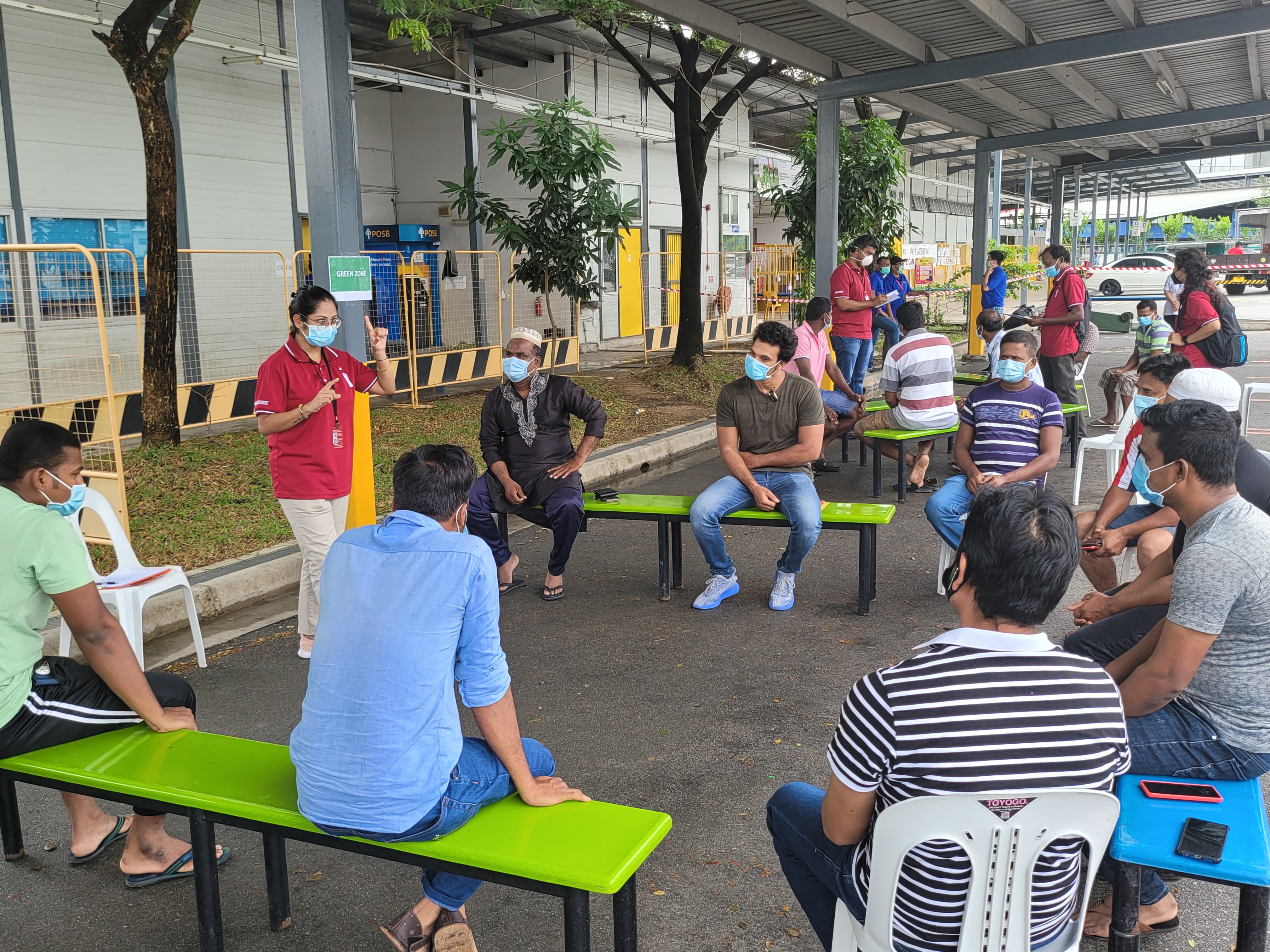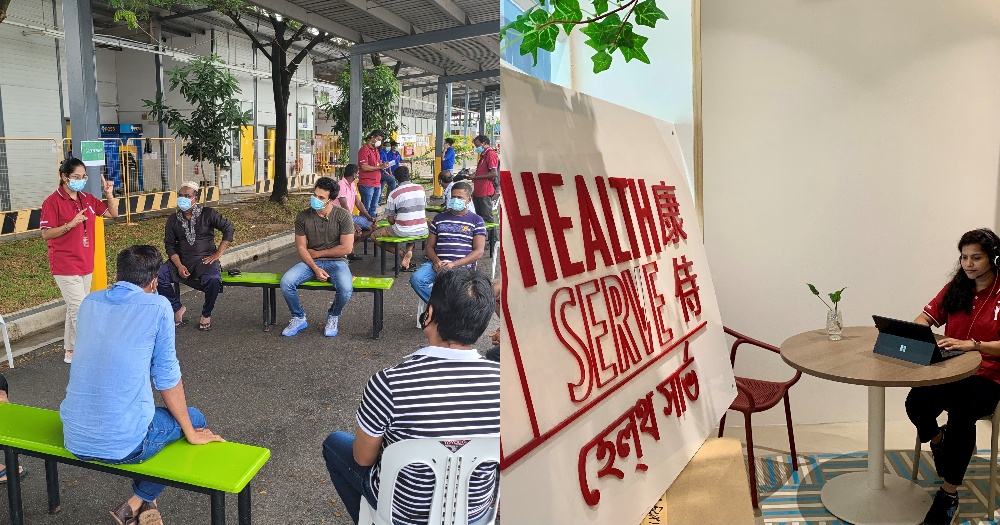A recent study conducted by the Institute of Mental Health (IMH) reported that Covid-19 was responsible for an increase in mental health issues in Singapore.
The results were grim: There was an increase in respondents facing severe stress, depression and clinical insomnia, with some respondents even experiencing suicidal thoughts.
There was a silver lining, however, as the study also showed that the majority of Singaporeans were willing to seek professional help for mental health issues relating to the virus.
But what happens to those who may find it difficult to get professional help?
Migrant workers in Singapore have been under exceptionally strict movement restrictions since April 2020, and while their basic physical needs are taken care of, their mental health needs can easily slide under the radar.
Luckily, there are a number of non-governmental organisations who seek to help migrant workers get the help they need.
One such organisation, HealthServe, recently launched Singapore's first 24-hour crisis helpline for migrant workers in order to address mental health issues that they encountered during the pandemic.
HealthServe began its mental health initiatives in 2019
HealthServe was founded in 2006, providing much needed healthcare for migrant workers at its Geylang clinic.
Over the years, the organisation branched out into more projects, setting up a pro bono legal clinic, dental services and even English and computer classes for migrant workers.
By 2019, Healthserve started mental health initiatives which provided counselling for migrant workers, recognising that mental health is just as important as physical health.
The initial team was small, comprising of only one counsellor.
Being severely short-handed, HealthServe recognised the need to recruit more counsellors, especially those who can speak common languages for migrant workers, such as Bengali or Tamil.
The organisation now has four counsellors who can speak native languages to migrant workers.
One of HealthServe's counsellors is Durga Arivan, who joined the organisation in 2020, just as the Covid-19 pandemic began.
Workers faced increased anxiety during Covid-19
Speaking with Mothership, Durga shared that the most common issue faced by migrant workers during Covid-19 was anxiety, stemming from a variety of different sources.
It was common for migrant workers to feel isolated, given how they have not been allowed to visit the wider community since April 2020, and have largely been restricted to their dorms when they are not working.
She said that that the circuit breaker period was especially tough for them, given that unlike normal Singaporeans, most of them were not even allowed out of their rooms, some of which didn't even have windows.
The financial insecurity that Covid-19 brought did not help matters, as workers were unable to work for extended periods of time whenever a cluster broke out within a dorm.
Durga said that overtime pay formed a significant portion of many a worker's compensation pre-Covid-19, so working fewer hours severely impacted their ability to send money home.
This combination of factors often fuelled a migrant worker's anxiety: Alone in a foreign land, he has to pray that he can continue working, without getting Covid-19, while worrying that his family may be a victim of the virus as well.
And unfortunately, this is not an uncommon occurrence, as several migrant workers that HealthServe spoke to faced personal tragedy in their lives, with loved ones passing away due to Covid-19 back home.
Worst of all, with the pandemic raging on, these workers were unable to see their loved ones off for the last time, compounding the pain they were experiencing.
Quarantines led to digital addiction for workers
Apart from anxiety, Durga shared that a common problem faced by migrant workers is addiction.
While my mind immediately thought of vices such as drugs or alcohol, I was surprised to hear that the most prevalent form of addiction that migrant workers face was in fact digital addiction, especially during Covid-19.
With limited recreation options, many workers turned to their phones for the only respite they have from work.
Workers, who mainly consumed content on free platforms like YouTube, Facebook and TikTok.
Most of the workers began binging on digital content last year, when they were quarantined during the height of the dormitory clusters.
Durga said that it was not uncommon for them to stay up till 3am in the morning watching videos, given that they have literally nothing else to do, and that such habits often lingered after the end of their quarantine.
While this may not seem as bad as substance abuse, digital addiction can have long-term consequences for workers, such as a loss of concentration while working, which can be deadly for workers, given the physical nature of their work.
Counselling migrant workers is very different from counselling Singaporeans
Given that HealthServe was familiar with the various stresses workers face, I thought providing them with the appropriate help was going to be a relatively straightforward matter.
As it turns out, providing counselling services for migrant workers is not as simple as having a location, and recruiting counsellors to speak to them.
For one, due to the Covid-19 pandemic, workers cannot even speak to any of HealthServe's counsellors personally, due to safe management measures at dormitories.
 HealthServe staff are currently unable to speak to workers in the dorms. Image via HealthServe.
HealthServe staff are currently unable to speak to workers in the dorms. Image via HealthServe.
Zoom sessions are not practical either, given that many workers would rather save their precious internet data (if they have any) for contacting their families or much-needed recreation, so counselling sessions have to take place over the phone.
This limits the work that HealthServe can do, as Durga explained that a phone conversation lacks non-verbal cues which can be crucial in a counselling session.
Some workers only learnt of mental health issues through physical effects
Prior to HealthServe's mental health initiatives, many workers did not seek help for mental health issues, as it was largely a foreign concept to them.
Workers who face severe stress or even depression would often approach HealthServe for help with their physical symptoms, like palpitations of the heart and stomach aches, before they learn that they were in fact struggling with their mental health.
While communicating this point may not always be easy, Durga said that HealthServe's counsellors often make good headway, largely because of their proficiency in native languages and their familiarity with how the workers think.
Once the workers understand their mental health issues, the counsellors can then begin to speak to them, and begin the healing process.
Workers are unable to grieve properly
However, the healing process may not always be smooth, especially if the workers have to deal with grief.
Counsellors often use the "Five Stages of Grief" framework (denial, anger, bargaining, depression and acceptance) to help individuals deal with their grief, although this framework differs with migrant workers.
Durga said that the process usually takes at least two weeks, before individuals are able to find closure.
However, migrant workers often lack the time to grieve.
For example, if an individual loses a loved one overseas, he is often not given the time to grieve, before having to go back to work.
In Durga's words, workers don't even have the privilege to be in denial over their loss, and often lose the chance to gain acceptance.
Their living conditions don't help either, as it's extremely difficult for someone to deal with their loss properly while living in a room with many others.
In extreme cases, Durga said that when a migrant worker passes away, his roommates often have to live in the same room, and sometimes even in the same bed, making it difficult for them to accept this loss.
In such cases, HealthServe will conduct group counselling sessions for those involved, and encourage them to be each other's support pillar.
Durga often encourages the workers to cry, giving them an outlet for their grief, which is instrumental in helping them through tough times.
Half of the calls to the helpline were outside office hours
To further provide support to the workers, HealthServe recently set up a 24-hour crisis helpline — a ready avenue of assistance for distressed workers who may not be able to leave their dorms.
The helpline is manned by HealthServe's team of crisis helpline specialists, including Menchie Macomis, a staff member with HealthServe who was formerly a management executive in a clinic.
There are about 100 volunteers, and training was conducted by both HealthServe and the Samaritans of Singapore (SOS).
Macomis described the role of a crisis helpline specialist as being the first point of contact for many workers.
They are trained to listen carefully to whoever is calling in, and quickly identify how they are able to support the caller emotionally.
"Sometimes, we can just be a good listener. They just want to share what they feel, and for the staff to empathise with them," said Macomis.
Sometimes, callers may exhibit signs of suicide risk, and staff are trained to quickly identify such cases, and call for an ambulance to take the caller to a hospital.
After the caller is no longer in immediate danger, he will then be passed on to HealthServe's counsellors for further intervention.
Half the calls happen outside office hours
Since its pilot launch on Aug. 1, 2021, the new helpline has seen 50 per cent of calls received outside office hours, between 7pm to 10am, demonstrating the demand for such a service.
Macomis explained that many workers had very little free time, and that they were often only able to process their thoughts at night, after they've returned from a long day of work.
The organisation receives an average of 200 calls per month, and spikes can be observed on significant occasions, such as when there is news of tightened restrictions in Singapore, or disasters occurring in the migrant workers' home countries.
In the near future, Durga hopes that the organisation can do more physical counselling sessions once safe management measures are relaxed, noting that one-to-one sessions in the flesh are often far more effective than sessions conducted over the phone.
With the organisation relying heavily on volunteers, they are always on the lookout for individuals willing to make a difference, so those interested can consider applying here.
The organisation is also working on a peer support leader programme, where selected migrant workers will be trained to identify other workers who may be feeling stressed, so that they can help direct these individuals to HealthServe.
 HealthServe's peer support leader training. Image via HealthServe.
HealthServe's peer support leader training. Image via HealthServe.
Both Durga and Macomis highlighted the importance of the peer support leaders, as they will be able to access more workers than the organisation is currently capable of.
They hope to train at least 300 leaders by the end of the year, and hinted that such peer support leaders may even have the potential to become crisis hotline specialists in the future, if they are given the right training.
The organisation continues to hold virtual workshops, teaching migrant workers the importance of self-care and rest.
Workshops may also be extended to employers and contractors, so they can learn more about the problems their workers face.
Those who are interested in donating to the organisation can also do so here.
Migrant workers are highly resilient
While it must be a lot of work having to organise so many different programmes, Durga showed no signs of fatigue when she talked about her work at HealthServe.
In fact, she said that the effort she puts in pales in comparison to the resilience of the migrant workers, who continue to work harder in spite of their difficulties.
She admitted that she personally learned how to be more resilient after observing the tenacity of the migrant workers, and said that there are many lessons Singaporeans can learn from these workers.
"In Singapore, the most affected group when it comes to the pandemic are migrant workers, but the group that showed us that they can go through with it — and still make the construction happen — are also the migrant workers."
Top image via HealthServe.
If you like what you read, follow us on Facebook, Instagram, Twitter and Telegram to get the latest updates.
